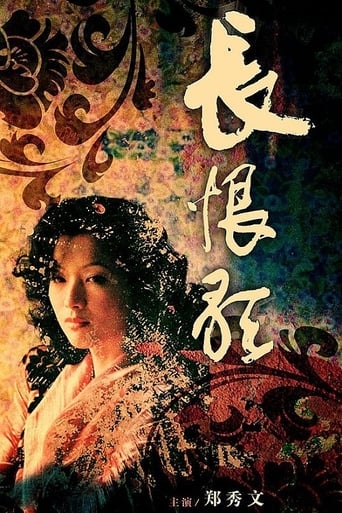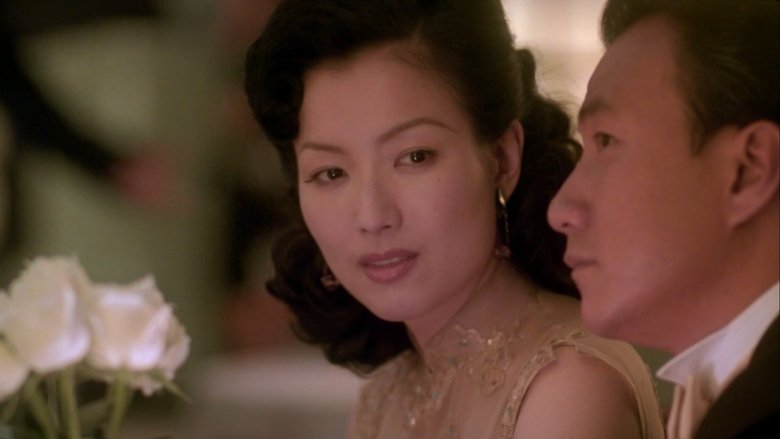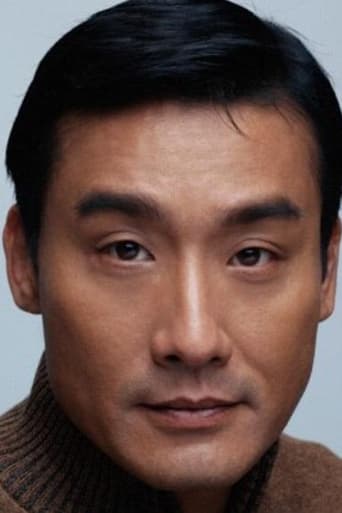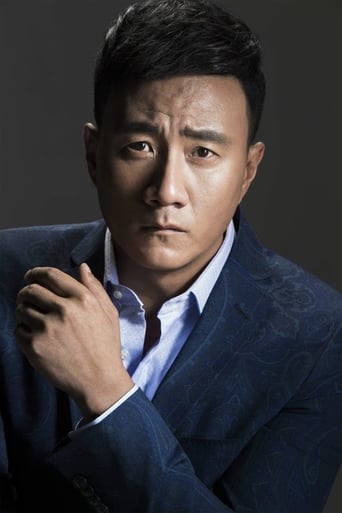

Everlasting Regret (2005)
A person's life is destined to be shorter than that of a city. Having spent her whole life in Shanghai, Qiyao has her moments of prosperity and her fair share of loneliness. She finally fades and disappears but Shanghai remains a metropolitan city. Shanghai in the 1930s is glamorous and seductive.
Watch Trailer
Cast


Reviews
the audience applauded
best movie i've ever seen.
Great movie! If you want to be entertained and have a few good laughs, see this movie. The music is also very good,
It’s not bad or unwatchable but despite the amplitude of the spectacle, the end result is underwhelming.
Much was made of this film when it was being made. There was lots of hype, lots of speculation about Sammi's health during the filming and lots of disappointment and criticism when it was released. And not unfounded criticism.Sammi Cheng plays Qiyao a girl who became Miss Shanghai in the 1940s with the help of a photographer, Cheng (Tony Leung Ka-Fai) and becomes the mistress of a Nationalist general. Soon after, the Communists win the civil war and Li flees China, asking a friend to tell Qiyao that he is dead. Qiyao decides to stay in Shanghai and endures the new Communist regime that sweeps China. But her life isn't easy, she has a child with a young businessman, Ming (Daniel Wu), who is force to ditch his responsibilities as a father, and much later a whirlwind but disastrous relationship with a young man, Kela (Huang Jue).Sammi Cheng had chosen to take this movie to mark a change in her acting career, moving away from her famous romantic comedies of the past. So, there was an eager expectation of a star performance, only let down by the movie's poor script and storyline.The plot feels a little chewed up, unsurprisingly, I guess, as it is an adaptation of a novel, but in the end you leave asking yourself what was the point of the story. It only just told of a life so sad most of the time as she jumped between repeated failures of her relationships. The men of her life were meant to reflect a period in the 40 years the film covers, but unfortunately these characters lacked depth in the final edit as their appearances were fleeting. It's all the more disappointing given the slow pace of the film.There is clearly an attempt to follow in the Wong Kar Wai ways of filming. Put in some beautiful sets, the gorgeous costumes and some imaginative camera-work. But unfortunately, they all fell short of the mark. The lack of anything that showed the city that the film referred to was an obvious omission. But despite the disappointment, there was one performance that did live up to the expectation.Tony Leung Ka-Fai (not to be confused with his more famous namesake, Tony Leung Chiu-Wai) is one of Hong Kong's finest and most experienced actors, and he steals the show with an assertive performance. So much so that he was awarded the Best Actor award for the Hong Kong Film Critics Awards.But his performance was just a glimmer of what could have been. For Sammi, I'm really disappointed as much criticism of the film was aimed at her, but really, she didn't have much to work with. And it is the lack of depth in the film that really let it down.One with many regrets.
The film follows the life & story story of QiYao (Sammi) in ShangHai from 1940s till 1980s. Sammi able to play her part quite well as a naive innocent teen, lover, mother, and mature woman. But her Mandarin is horrible. It makes you wanna laugh especially when she is angry. This is what I find most distracting. Mostly she is portrayed with blank look. Maybe it is the gloomy life of the character QiYao, always tried to find a better man. The story is a bit slow. It can become boring in times. Nevertheless this is a classic. It takes the audience experiencing life in Shang Hai from its heyday to the rise of Communist and its gloomy communist days.
Although it certainly won't be everybody's cup of tea, "Everlasting Regret" is a fine example of a movie which reveals more by what it _doesn't_ show than by what it actually presents on-screen. Stanley Kwan undertakes the difficult task of telling the history of a city (Shanghai, roughly from the 1940s to the 1980s) through the personal histories of a few of its citizens -- without hardly ever showing a shot of the city itself. Indeed, music, clothes and hairstyles are nearly all we get in view of clues as to the passage of time, and some key events -- whether personal or political -- are barely even commented upon, much less shown directly. This admittedly makes the film somewhat difficult to follow (and presupposes at least a basic knowledge of recent Chinese history), but at the same time it manages to make the experience much more emotional and, well, _personal_ than a 'standard' historical piece would ever achieve. Instead of staging elaborate historical events and recreating architecture, Kwan masterfully focuses on the personal details and the effects these historical events (together with the passage of time itself) have had on the characters' lives. To see (or better yet: to feel) these effects, you need to concentrate on the details: the clothes, the furniture, the design of cups and glasses, the looks exchanged and the gazes averted. The details are supposedly where the devil is -- but it's also where the beauty of this film lies. For those of you who like to play the comparison game: "Everlasting Regret" is like a tranquilized Wong Kar Wai with a political background, or an emotional, de-contextualized Hou Hsiao-hsien. Be that as it may, if you're interested in 'serious' Asian cinema, you certainly won't feel any regrets about giving this one a chance.
With all the local hype from it's entry to the Venice festival, "Everlasting Regret" turned out to be an anticlimax. A local critic who has read the book wonders why all the intriguing details have been cut out, leaving a bland, banal shell of a plot. I have not read the book. Based on the script, I have a thought that director Kwan would be better off taking a gamble, making this a 150 minute epic, which will either give the audience enough flesh and bone to keep them intrigued or bore them to death. He didn't and we end up having an average length 115 minute movie that is too fragmented and scanty in details to allow the audience to feel any real empathy. Maybe the reason why he didn't is the shrewd realization that a 150- minute epic needs a certain level of acting to carry it, but I'll come to that later.The story takes us through the life of a Shanghainese woman Wang Qiyao (Sammi Cheng) from schoolgirl to middle-aged woman, focusing on her relationships with several men who wander in and out of her life. One, however, stays from beginning to end, a mentor cum guardian angel figure played beautifully by Leung Ka-fai. As a matter of fact, the names of Leung and Cheng lead off in the opening credit and the story is narrated with voice over from Leung's character.Another "star" of the movie is supposedly Shanghai, from the war years, through the Cultural Revolution, to the eighties. Yet, the only thing we see of the city is a faded picture of The Bund. Whether William Cheung's artful mise-en-scene can be deemed to represent Shanghai is a point to be debated.Deserving compliment is the cast. Leung is at his very best, playing the devoted photographer who never once shouted to Wang Qiyao until near last scene. He actually has his own stories, with his wife as well as with his "good friend" Lili, which were barely touched on. If anybody in this movie has any claim to an award, it's Leung. Lili, who initially introduced Leung's character to Wang Qiyao, is played by Mainland actress Su Yan, whose every nuance tells of her good acting academy training. Veteran Hu Jun is ever so dependable, playing the only man who really has Wang Qiyao's heart. And yes, Daniel Wu with a mustache is cute, if nothing else.At the end of the day, the soul of the movie is Wang Qiyao. What kind of a woman is she educated, independent, rebellious, pleasure seeking, devoted, all of the above, and more? Sammi Cheng tried very hard but unfortunately, more often than not, her blank stare can be taken quite literally. I like her modesty and humility in the radio interviews (I heard 4 of them on one single day, for heaven's sake) saying that all she wanted to do was to try something different from her traditional cutie roles. But Wang Qiyao, I think, is a little too big a step for her to take. Doing something like what Meg Ryan did with "In the cut" or, better still, Kate Hudson with "Skeleton key" would have been a much better move.So it boils down to my summary line the post-movie breeze-shooting turned into an exercise in casting. Maggie Cheung has been offered the role and turned it down. Stanley Kwan's first choice, reportedly, was actually lovely Wu Chien-lien, who has been sorely missed by her fans since her 1997 appearance in "Ban sheng yuan" (her cameo appearance in Jianghu last year was tantalizingly brief). She would have made a good Wang Qiyao. Other choices that were brought up were Taiwan's Rene Liu, who can certainly act but may not have that elusive Shanghainese air, and Hollywood's Vivian Wu, who was actually born in Shanghai and would be a good choice (remember her in "The Soong Sisters"?). But even Su Yan, who plays Lili, would be a better choice than Sammi Cheng. One would only need to watch the scene when they appear together to see why.




